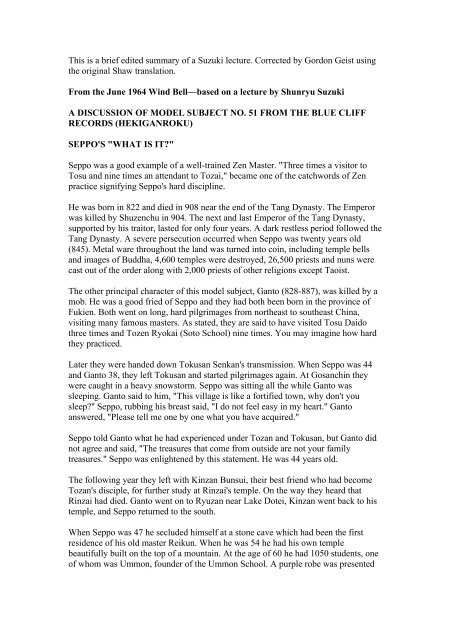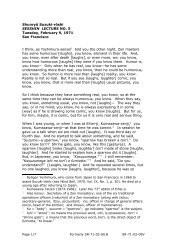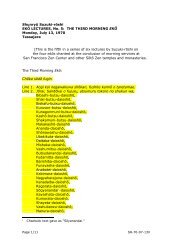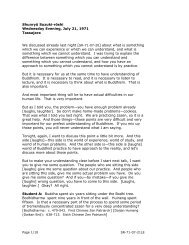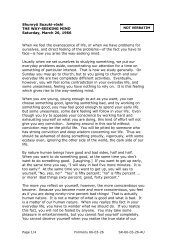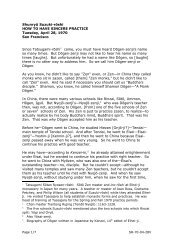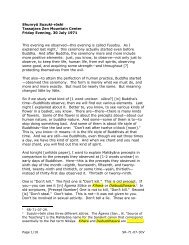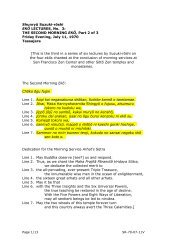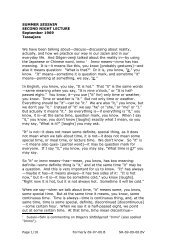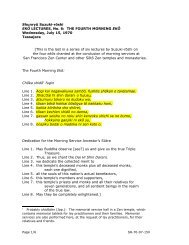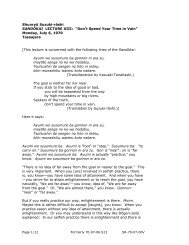This is a brief edited summary of a Suzuki lecture
This is a brief edited summary of a Suzuki lecture
This is a brief edited summary of a Suzuki lecture
You also want an ePaper? Increase the reach of your titles
YUMPU automatically turns print PDFs into web optimized ePapers that Google loves.
<strong>Th<strong>is</strong></strong> <strong>is</strong> a <strong>brief</strong> <strong>edited</strong> <strong>summary</strong> <strong>of</strong> a <strong>Suzuki</strong> <strong>lecture</strong>. Corrected by Gordon Ge<strong>is</strong>t using<br />
the original Shaw translation.<br />
From the June 1964 Wind Bell—based on a <strong>lecture</strong> by Shunryu <strong>Suzuki</strong><br />
A DISCUSSION OF MODEL SUBJECT NO. 51 FROM THE BLUE CLIFF<br />
RECORDS (HEKIGANROKU)<br />
SEPPO'S "WHAT IS IT?"<br />
Seppo was a good example <strong>of</strong> a well-trained Zen Master. "Three times a v<strong>is</strong>itor to<br />
Tosu and nine times an attendant to Tozai," became one <strong>of</strong> the catchwords <strong>of</strong> Zen<br />
practice signifying Seppo's hard d<strong>is</strong>cipline.<br />
He was born in 822 and died in 908 near the end <strong>of</strong> the Tang Dynasty. The Emperor<br />
was killed by Shuzenchu in 904. The next and last Emperor <strong>of</strong> the Tang Dynasty,<br />
supported by h<strong>is</strong> traitor, lasted for only four years. A dark restless period followed the<br />
Tang Dynasty. A severe persecution occurred when Seppo was twenty years old<br />
(845). Metal ware throughout the land was turned into coin, including temple bells<br />
and images <strong>of</strong> Buddha, 4,600 temples were destroyed, 26,500 priests and nuns were<br />
cast out <strong>of</strong> the order along with 2,000 priests <strong>of</strong> other religions except Tao<strong>is</strong>t.<br />
The other principal character <strong>of</strong> th<strong>is</strong> model subject, Ganto (828-887), was killed by a<br />
mob. He was a good fried <strong>of</strong> Seppo and they had both been born in the province <strong>of</strong><br />
Fukien. Both went on long, hard pilgrimages from northeast to southeast China,<br />
v<strong>is</strong>iting many famous masters. As stated, they are said to have v<strong>is</strong>ited Tosu Daido<br />
three times and Tozen Ryokai (Soto School) nine times. You may imagine how hard<br />
they practiced.<br />
Later they were handed down Tokusan Senkan's transm<strong>is</strong>sion. When Seppo was 44<br />
and Ganto 38, they left Tokusan and started pilgrimages again. At Gosanchin they<br />
were caught in a heavy snowstorm. Seppo was sitting all the while Ganto was<br />
sleeping. Ganto said to him, "<strong>Th<strong>is</strong></strong> village <strong>is</strong> like a fortified town, why don't you<br />
sleep?" Seppo, rubbing h<strong>is</strong> breast said, "I do not feel easy in my heart." Ganto<br />
answered, "Please tell me one by one what you have acquired."<br />
Seppo told Ganto what he had experienced under Tozan and Tokusan, but Ganto did<br />
not agree and said, "The treasures that come from outside are not your family<br />
treasures." Seppo was enlightened by th<strong>is</strong> statement. He was 44 years old.<br />
The following year they left with Kinzan Bunsui, their best friend who had become<br />
Tozan's d<strong>is</strong>ciple, for further study at Rinzai's temple. On the way they heard that<br />
Rinzai had died. Ganto went on to Ryuzan near Lake Dotei, Kinzan went back to h<strong>is</strong><br />
temple, and Seppo returned to the south.<br />
When Seppo was 47 he secluded himself at a stone cave which had been the first<br />
residence <strong>of</strong> h<strong>is</strong> old master Reikun. When he was 54 he had h<strong>is</strong> own temple<br />
beautifully built on the top <strong>of</strong> a mountain. At the age <strong>of</strong> 60 he had 1050 students, one<br />
<strong>of</strong> whom was Ummon, founder <strong>of</strong> the Ummon School. A purple robe was presented
to him by Emperor K<strong>is</strong>o. H<strong>is</strong> posthumous name <strong>is</strong> Shinkaku Da<strong>is</strong>hi (Great master<br />
Shinkaku).<br />
Introductory Word by Engo<br />
Engo introducing the subject said, "If you are caught by the slightest idea <strong>of</strong> good and<br />
bad, your mind (true mind, essence <strong>of</strong> mind) will be lost in the realm <strong>of</strong> d<strong>is</strong>order. If<br />
you do not have an idea <strong>of</strong> the order <strong>of</strong> stages, there will be no purpose in your<br />
practice. Now which do you think <strong>is</strong> better, to pursue the relative way or to resume the<br />
absolute?"<br />
(Note: The relative form and color that you see now are the conditioned attributes <strong>of</strong><br />
the unconditioned—constant—absolute. The absolute <strong>is</strong> the eternal unconditioned that<br />
gives r<strong>is</strong>e to the conditioned, relative ways <strong>of</strong> practice. What you see now <strong>is</strong> the<br />
eternal unconditionality <strong>of</strong> the absolute and the momentous conditioned relative.<br />
Actually the positive or relative way <strong>is</strong> not different from the negative or absolute<br />
way. Even though you follow the order <strong>of</strong> the stages in your actual practice, if each<br />
relative stage, even the first stage, <strong>is</strong> brought out in full relief against the darkness <strong>of</strong><br />
the absolute, and if there <strong>is</strong> no fumbling and groping in your practice under the right<br />
teacher, then your practice <strong>is</strong> already in the realm <strong>of</strong> Reality. Each relative stage bears<br />
the full meaning <strong>of</strong> the absolute and the absolute reveals its actual meaning in the<br />
relative practice. If you w<strong>is</strong>h to understand th<strong>is</strong> secret, you must study under the right<br />
teacher not only by words but also by actual conduct on each moment under particular<br />
circumstances).<br />
To continue with Engo's introduction, he said, "If you become attached to some<br />
particular way <strong>of</strong> expressing Zen, captivated by something told in words or verse,<br />
attached to some method <strong>of</strong> instruction (scolding voice, slapping face, seizing by the<br />
collar and casting <strong>of</strong>f, drawing a circle, lifting up one finger, etc.) you are nothing<br />
better than the parasitic weeds wrapped around dead trees. Even if a man thinks that<br />
he <strong>is</strong> living in the land <strong>of</strong> Tathagata itself, when he <strong>is</strong> possessed by the idea <strong>of</strong> th<strong>is</strong><br />
land or that land, he <strong>is</strong> said to be watching the moon <strong>of</strong> h<strong>is</strong> old home which <strong>is</strong> now ten<br />
thousand miles away. Well, have you understood what I am saying? If not, here <strong>is</strong> an<br />
actual Koan for you to ponder."<br />
Main Subject<br />
When Seppo was in h<strong>is</strong> hermitage on Mount Seppo, two unnamed monks v<strong>is</strong>ited him<br />
and bowed to him (what <strong>is</strong> the bow?). Seppo saw them coming, pushed open h<strong>is</strong> gate,<br />
jumped out, and said, "What <strong>is</strong> it?" (An indicative question, a question and yet an<br />
answer. Do you understand the real Seppo? Tell me what it <strong>is</strong>. "He <strong>is</strong> an iron flute<br />
with no holes," Engo said). The two monks said, "What <strong>is</strong> it?" (The two monks did<br />
not fail to respond, but Engo says, "They are old sounding-boards covered be velvet."<br />
They were chalk and not cheese). Seppo made a bow to them and went back to h<strong>is</strong><br />
room. (Engo said, "<strong>Th<strong>is</strong></strong> <strong>is</strong> not a dragon because it has no legs, but it <strong>is</strong> certainly not a<br />
snake because it has no horns." I say, "What <strong>is</strong> it?")<br />
The two monks later extended their travels to v<strong>is</strong>it Ganto in Ganto Mountain. Ganto<br />
said, "Where did you come from?" (Ganto has already caught them). The monks said,
"We are from Reinan." (Be quick and give him a right answer). Ganto said, "Then you<br />
must have met Seppo, haven't you?" (It <strong>is</strong> very kind <strong>of</strong> him to wait for their right<br />
answer). The monks said, "Yes we have." (He was not asking them yes or no, but<br />
whether they had understood the actual Seppo). Ganto said, "What did he say?" They<br />
told him all about what had happened when they v<strong>is</strong>ited Seppo. Ganto said, "What did<br />
he say after all?" thus requesting their final answer. But they said, "He did not say<br />
anything." He bowed and went back to h<strong>is</strong> room. Thereupon Ganto said, "Oh, what<br />
have I done? When I was at Tokusan with him, I should have let him know the verse<br />
<strong>of</strong> my deathbed. If only I had told him that, he would not have been thrown into such<br />
confusion." (Although Ganto mentioned Seppo's name, he actually meant to give the<br />
monks h<strong>is</strong> own last word. Then, what <strong>is</strong> h<strong>is</strong> last word?)<br />
The two monks were allowed to spend the summer at Ganto's monastery. At the end<br />
<strong>of</strong> the session, the two monks asked Ganto's instruction about the meaning <strong>of</strong> Seppo's<br />
unusual behavior and what Ganto had meant by: How I w<strong>is</strong>h I had told him my last<br />
word. Ganto said, "Why did you not ask me before?" They said, "Because we thought<br />
your last word too valuable to ask about." Thereupon Ganto said, "Seppo <strong>is</strong> a fellow<br />
countryman <strong>of</strong> mine. He and I always went on pilgrimages together, yet we will not<br />
die together. If you want to know my last word for Seppo and you, I will tell you what<br />
it was. It <strong>is</strong> nothing but, '<strong>Th<strong>is</strong></strong> <strong>is</strong> it. '"<br />
Wherever Seppo and Ganto might be, however long they might live as the best friend<br />
<strong>of</strong> each other, what Seppo did <strong>is</strong> actual Seppo and what Ganto did <strong>is</strong> actual Ganto.<br />
"<strong>Th<strong>is</strong></strong> <strong>is</strong> it" should always be the last word for oneself and for others.<br />
Dogen Zenji said, "Breathing in or breathing out, after all, what <strong>is</strong> it?" No one can tell<br />
what it <strong>is</strong>.<br />
Now, you may not be calm or patient enough to wait for the right answer, but let us<br />
ask ourselves if our activity <strong>is</strong> either subjective or objective. Let me point to th<strong>is</strong>:<br />
What do we mean by 'it'? Do you mean breathing itself or the idea <strong>of</strong> breathing. If you<br />
mean the idea <strong>of</strong> breathing it will be another matter. If you mean breathing itself each<br />
moment, you have solved the problem already when you breathe in and out on each<br />
moment in calmness with Big Mind. Now, you will understand that the right answer<br />
to 'what <strong>is</strong> it?' should always be 'th<strong>is</strong> <strong>is</strong> it.'<br />
Ganto was killed soon after leaving h<strong>is</strong> last word to h<strong>is</strong> friend Seppo.<br />
<strong>Th<strong>is</strong></strong> translation and commentary are my poor <strong>of</strong>fering to these two great masters.<br />
Appreciatory Words by Setcho<br />
Referring to Ganto's last words to Seppo,<br />
I will ask you, Enlightened Mind,<br />
Is daytime different from nighttime or the same?<br />
Even though they lived fully acquainted with each other<br />
In complete companionship,<br />
They were to die in different places. Yes.<br />
They should die in different ways.
Buddha should have curled hair,<br />
Bodhidharma should be blue-eyed.<br />
From East, West, South, and North let us<br />
Come back to our old home,<br />
In a midnight sky to see<br />
A plain white<br />
Mountain covered with snow.


